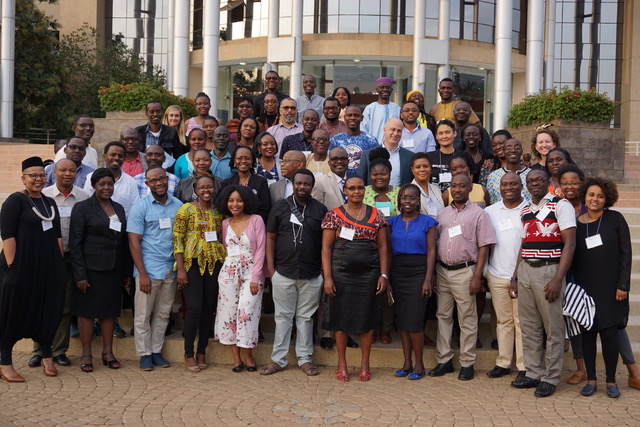The Next Generation Social Sciences in Africa: Doctoral Dissertation Proposal Fellowship supports the completion of doctoral degrees and promotes next-generation social science research in Ghana, Kenya, Nigeria, South Africa, Tanzania, and Uganda. The fellowships back dissertation research on peace, security, and development topics.
Application deadline: February 1, 2022
Please see the following list of prospective issues that are considered relevant to Next Gen fellowships:
- Causes and drivers of conflict
- Institutional and local approaches to conflict prevention, management and resolution
- National and Regional approaches to peace, security and development
- Identity and conflict
- Gender, youth, conflict, peace and security
- Conflict, peace and human mobilities
- Histories, Arts and Cultures of conflict and peace
- State-Society relations
- Economic and Humanitarian perspectives to conflict and peace
- Democracy, human rights and development
- Post-conflict development, reconstruction and reconciliation
- Law, peace agreements and transitional justice
- International justice and war crimes
- Law and constitutionalism
- Natural resource governance and development
- Climate Change, conflict, peace and security
- Globalization and emerging insecurities
- Peace education
- Media, conflict, peace and security
Table of contents

Benefits of the Next Generation Social Sciences in Africa Fellowship
Doctoral dissertation proposal fellowships support PhD students working on developing a doctoral dissertation research proposal as well as students who recently completed a master’s degree and seek to enroll in a PhD program. The fellowships support short-term research costs of up to US$3,000 to develop a doctoral dissertation proposal. This program also includes two workshops each year that have been designed to create fellows’ networks, help fellows refine, develop and strengthen research questions, match research methods to questions, engage key literature in their fields, and finalize their doctoral research proposals.
Thematic Priorities:
The program features a thematic focus on peace, security, and development in order to renew basic research agendas and strengthen interdisciplinary social science research capacity addressing these issues.
The program encourages innovative research on peace, security, and development topics, broadly conceived, moving the boundaries of scholarship and research by exploring concrete linkages between these themes. We envision supporting a diverse set of projects seeking to shed light on a range of economic, political, social, conflict, and peacebuilding processes using evidence-based research.
Some projects, we hope, will examine large-scale phenomena and others small-scale social processes. The strongest projects typically will explore connections across these scales. Some research projects will rigorously explore elements of governance, civil society, human rights, peacebuilding mechanisms/institutions and processes, and rule of law. Others will explore root causes of conflict, emerging trajectories and forms of conflict, insecurities, and human mobilities. Above all projects should advance important fields of study and social science knowledge.
Eligibility Criteria for African Doctorate Degree Holders
All applicants must:
- be citizens of any sub-Saharan African country
- be enrolled, or intend to enroll by the time of the award, and working towards a PhD in an accredited university, or affiliated to an institution in Ghana, Kenya, Nigeria, South Africa, Tanzania, or Uganda
- hold a master’s degree at the time of application
As of May 2015, the program prioritizes applicants holding a faculty position or demonstrating a durable commitment to higher education in Africa, but does not restrict eligibility to such individuals.
The program seeks to promote diversity and encourages women to apply.
How to Submit Your Doctoral Dissertation Proposal
All applications must be submitted using the online application portal.
Strong proposals will offer clear and concise descriptions of the project and its significance. Proposals should display thorough knowledge of the relevant social science literature that applicants will engage in and the methodologies relevant to the project. In addition, applicants must demonstrate that all proposed activities are feasible and can be completed in a timely manner. All proposals will be evaluated for these criteria by an independent, international committee of leading scholars from a range of social science and related disciplines.
Fellows must be willing to attend two workshops sponsored by the SSRC each year that are intended to help early-career faculty engage in scholarly reflections, research and writing. We anticipate awarding up to 45 fellowships in total across all three categories each year.
Information on eligibility, the application process, and award details can be found in our Answers to Frequently Asked Questions (FAQs).
For inquiries or technical questions pertaining to the online application portal, please contact SSRC staff from the Next Generation Social Sciences in Africa Program: [email protected].
All materials must be submitted no later than 11:59 pm (EST) on February 1, 2022.
brought to you by Scholarships for Africans
Scholarships for Africans is a premier scholarship information blog committed to bringing more opportunities for Africans globally. They are part of the African Scholar Initiative, powered by Scholarship Hippo.
Be a part of our growing community!
JOIN: Scholarships for Africans Facebook group
LIKE: African Scholar Initiative Facebook page
FOLLOW: Scholarships for Africans Instagram page


[…] Source link […]